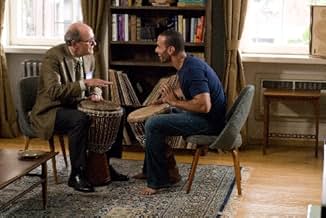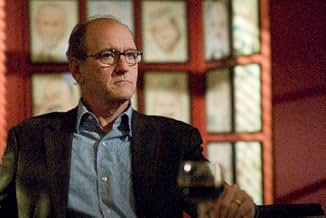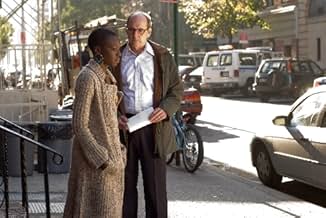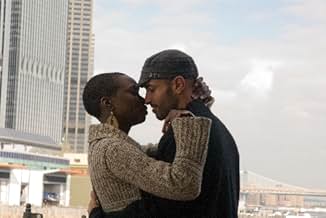A college professor travels to New York City to attend a conference and finds a young couple living in his apartment.A college professor travels to New York City to attend a conference and finds a young couple living in his apartment.A college professor travels to New York City to attend a conference and finds a young couple living in his apartment.
- Nominated for 1 Oscar
- 19 wins & 35 nominations total
- Director
- Writer
- All cast & crew
- Production, box office & more at IMDbPro
Featured reviews
Richard Jenkins' portrayal of lacklustre professor Walter is beautifully underplayed, somnambulistically acting out the various roles of his life as a stilted economics professor. The beginning scenes unravel artfully and launch into the story where Walter is abruptly introduced to the young couple (Tarek and Zainab).
The ensuing impromptu friendship that develops is well conceived. The wariness and strong-will of Zainab contrasts well against her boyfriend Tarek's more forthright relaxed nature. The interplay between Tarek, Zainab and Walter is at times awkward, at times touching. I felt that these quality performances go a long way towards forgiving the unlikely set of circumstances (and responses) that brought and kept the three characters together.
I thought the scenes where Walter learns to play the djembe were beautifully played; Walter's awkward but curious initiation to drumming and the (unexpected) expression of pure joy on his face while playing added believable depth to an otherwise restrained and austere performance.
Walter's exposure to the djembe perhaps underpins the films well-intentioned message that our lives are enriched by living side-by side with other cultures. Good intentions aside, I think the second half of the film suffers because of the filmmaker's heavy-handed desire to go further and promote the idea that 'good people suffer in the hands of US immigration control'.
In my opinion producing a film with any agenda is problematic because it requires a degree of rationalisation and simplification which works against interesting characterisation. Life is very rarely straightforward and when it is straightforward, it isn't interesting to watch.
In the case of the second half of The Visitor, I felt that this overarching requirement to show the characters in a positive light removed any sense of conflict the characters might have otherwise possessed. The story no longer had a life of it's own and seemed to involve reaching a predetermined conclusion through any route possible.
The character of Tarek's (caring / strong / dignified) mother, fell short of the high-expectations that I'd built-up during the first half of the film. I felt her portrayal was lacking and I didn't fully understand the function her character played. The subsequent relationship that develops between Walter and Mouna seemed gratuitous and left too many questions unanswered.
After watching this and Tom McCarthy's first film (The Station Agent), it's clear to me that McCarthy is an accomplished director / writer - who perhaps excels at directing character-based stories. I think this film suffers because halfway through the film McCarthy attempts to move focus from a rich exploration of character, to a slightly ill-conceived issue-based drama.
Nevertheless, I thoroughly enjoyed The Visitor.
The ensuing impromptu friendship that develops is well conceived. The wariness and strong-will of Zainab contrasts well against her boyfriend Tarek's more forthright relaxed nature. The interplay between Tarek, Zainab and Walter is at times awkward, at times touching. I felt that these quality performances go a long way towards forgiving the unlikely set of circumstances (and responses) that brought and kept the three characters together.
I thought the scenes where Walter learns to play the djembe were beautifully played; Walter's awkward but curious initiation to drumming and the (unexpected) expression of pure joy on his face while playing added believable depth to an otherwise restrained and austere performance.
Walter's exposure to the djembe perhaps underpins the films well-intentioned message that our lives are enriched by living side-by side with other cultures. Good intentions aside, I think the second half of the film suffers because of the filmmaker's heavy-handed desire to go further and promote the idea that 'good people suffer in the hands of US immigration control'.
In my opinion producing a film with any agenda is problematic because it requires a degree of rationalisation and simplification which works against interesting characterisation. Life is very rarely straightforward and when it is straightforward, it isn't interesting to watch.
In the case of the second half of The Visitor, I felt that this overarching requirement to show the characters in a positive light removed any sense of conflict the characters might have otherwise possessed. The story no longer had a life of it's own and seemed to involve reaching a predetermined conclusion through any route possible.
The character of Tarek's (caring / strong / dignified) mother, fell short of the high-expectations that I'd built-up during the first half of the film. I felt her portrayal was lacking and I didn't fully understand the function her character played. The subsequent relationship that develops between Walter and Mouna seemed gratuitous and left too many questions unanswered.
After watching this and Tom McCarthy's first film (The Station Agent), it's clear to me that McCarthy is an accomplished director / writer - who perhaps excels at directing character-based stories. I think this film suffers because halfway through the film McCarthy attempts to move focus from a rich exploration of character, to a slightly ill-conceived issue-based drama.
Nevertheless, I thoroughly enjoyed The Visitor.
Mr. McCarthy's film seems to be working at several levels, a main one being the character development of Walter Vale, and another the effects of blind bureaucracy upon the human spirit.
It was interesting to see Vale's callous attitude toward one of his students early on when the lad was late turning in a class paper. The student's reason: some serious personal issues. Did the professor show any extra understanding or compassion for the young man? No; the paper was late and therefore simply unacceptable.
Yet when Vale wanted information and understanding later on at the immigration department when making inquiry about the deportation of Tarek Kahlel, what did he do but blatantly rant about how insensitive and unimpassioned was the system. This, after he'd previously witnessed a similar situation at the front desk with another frustrated inquirer.
What's the country to do, having immigration regulations in place: excuse and make special exceptions for certain illegal aliens? As Vale showed no interest in learning about his student's situation, he yet expected the immigration department to bend to his personal demands.
Vale was certainly a pathetic prof, drifting through life without energy or passion. His encounter with Tarek and his wife and mother all seemed rather arbitrary, allowing these relationships to become his interest, for lack of a better direction. Personally, I felt sorry for this glum character, yet mindful that the death of a spouse can cause some derailment in direction.
The cast was uniformly fine, with special kudos to Richard Jenkins and Haaz Sleiman.
It was interesting to see Vale's callous attitude toward one of his students early on when the lad was late turning in a class paper. The student's reason: some serious personal issues. Did the professor show any extra understanding or compassion for the young man? No; the paper was late and therefore simply unacceptable.
Yet when Vale wanted information and understanding later on at the immigration department when making inquiry about the deportation of Tarek Kahlel, what did he do but blatantly rant about how insensitive and unimpassioned was the system. This, after he'd previously witnessed a similar situation at the front desk with another frustrated inquirer.
What's the country to do, having immigration regulations in place: excuse and make special exceptions for certain illegal aliens? As Vale showed no interest in learning about his student's situation, he yet expected the immigration department to bend to his personal demands.
Vale was certainly a pathetic prof, drifting through life without energy or passion. His encounter with Tarek and his wife and mother all seemed rather arbitrary, allowing these relationships to become his interest, for lack of a better direction. Personally, I felt sorry for this glum character, yet mindful that the death of a spouse can cause some derailment in direction.
The cast was uniformly fine, with special kudos to Richard Jenkins and Haaz Sleiman.
In Connecticut, the widower and lonely Professor Walter Vale (Richard Jenkins) has a boring life teaching for one class only in the college and trying to learn how to play piano despite not having the necessary musical talent. Walter is assigned to attend a conference about Global Policy and Development in the New York University and give a lecture about a paper that he is coauthor. When he arrives in his apartment in New York, he finds the Syrian musician Tarek Khalil (Haaz Sleiman) and the Senegalese street vendor Zainab (Danai Gurira) living there. He sympathizes with the situation of the illegal immigrants and invites the couple to stay with him. Tarek invites him to go to his gig in the Jules Live Jazz and Walter is fascinated with his African drum; then Tarek offers to teach Walter to play the drum. However, after an incident in the subway, Tarek is arrested by the police and sent to a detention center of immigrants. Walter hires a lawyer to defend Tarek and out of the blue, Tarek's mother Mouna Khalil (Hiam Abbass) appears in Walter's apartment coming from Michigan; he invites her to stay in Tarek's room and while trying to release Tarek, Walter and Mouna get close to each other and he finds a reason to live an exciting life again.
"The Visitor" is a touching and realistic tale of friendship and self- discovery in a world of intolerance. It is ironic to see the poster "Immigrants – The Strength of America" and sad to see the arrogance of the officers responsible for the security. The story is supported by an excellent screenplay; a simple and effective direction of Thomas McCarthy, who is also the writer; and magnificent performances of the cast. The always awesome Richard Jenkins, who plays a middle-aged intellectual that lives a senseless life after the death of his wife that finds a reason to live with music, the elegant Hiam Abbass that helps Walter to find the meaning of life together with her son, performed by the unknown Haaz Sleiman have an amazing work. My vote is eight.
Title (Brazil): "O Visitante" ("The Visitor")
"The Visitor" is a touching and realistic tale of friendship and self- discovery in a world of intolerance. It is ironic to see the poster "Immigrants – The Strength of America" and sad to see the arrogance of the officers responsible for the security. The story is supported by an excellent screenplay; a simple and effective direction of Thomas McCarthy, who is also the writer; and magnificent performances of the cast. The always awesome Richard Jenkins, who plays a middle-aged intellectual that lives a senseless life after the death of his wife that finds a reason to live with music, the elegant Hiam Abbass that helps Walter to find the meaning of life together with her son, performed by the unknown Haaz Sleiman have an amazing work. My vote is eight.
Title (Brazil): "O Visitante" ("The Visitor")
It's only about twice a decade that I run across a movie that really impresses me. It's usually an obscure film that I entered with no expectations -- but left blown away by its cinematic achievement.
I just saw such a film tonight. "The Visitor" A small independent production with zero-advertising. Made by Tom McCarthy whose prior film, "The Station Agent," was an imperfect, character-absorbed drama.
The star of this movie is an actor (Richard Jenkins) whom you'll recognize from his numerous roles as minor-characters, most notably the dead-patriarch in "Six Feet Under." All of the other actors are completely unknown, but notably talented.
The appeal of this film is its story. An aged, listless academic, whose wife died earlier, floats through his uninteresting life until something happens to jar him. What happens next is unexpected, interesting and poignant. It would ruin the story if I told it to you, so you'll have to trust me. Suffice it to say it's a story of rebirth.
Like most of my favorite films, it has comedy, pathos, surprises, authenticity and a philosophical examination of what it means to be human. In short, everything, even politics.
And the presentation is skillfully-crafted. McCarthy demonstrates what was good about his prior work without dragging it down with what was bad about that work.
See it.
I just saw such a film tonight. "The Visitor" A small independent production with zero-advertising. Made by Tom McCarthy whose prior film, "The Station Agent," was an imperfect, character-absorbed drama.
The star of this movie is an actor (Richard Jenkins) whom you'll recognize from his numerous roles as minor-characters, most notably the dead-patriarch in "Six Feet Under." All of the other actors are completely unknown, but notably talented.
The appeal of this film is its story. An aged, listless academic, whose wife died earlier, floats through his uninteresting life until something happens to jar him. What happens next is unexpected, interesting and poignant. It would ruin the story if I told it to you, so you'll have to trust me. Suffice it to say it's a story of rebirth.
Like most of my favorite films, it has comedy, pathos, surprises, authenticity and a philosophical examination of what it means to be human. In short, everything, even politics.
And the presentation is skillfully-crafted. McCarthy demonstrates what was good about his prior work without dragging it down with what was bad about that work.
See it.
A genuinely unexpected gem. As he proved with his first film as a director and screenwriter, 2003's "The Station Agent", Thomas McCarthy knows how to convey the fine line between solitude and loneliness in his characters' lives with an emotional preciseness that doesn't call attention to itself. It's not surprising that McCarthy is an actor because he's able to capture the very subtle nuances in behavior in actors that make his work feel like Edward Hopper paintings come to life. As a result, you pay attention to a simple gesture, a passing glance, a resigned sigh. This time, his protagonist is Walter Vale, an enervated, middle-aged economics professor at a Connecticut college. Widowed and wholly lacking in professional motivation, he begrudgingly accepts an assignment to go to an academic conference at NYU and present a paper on globalization he really didn't write.
Coming back to a Greenwich Village flat he rarely uses, he is surprised to find a couple living there. Not squatters but unfortunate victims of a rental scam, they turn out to be illegal aliens, a Syrian percussionist named Tarek and his girlfriend Zainab, a Senegalese who makes and sells handcrafted jewelry. As withdrawn from life as Walter is, he slowly finds himself bonding with the couple and lets them stay indefinitely. Zainab is slow to trust Walter, but Tarek and Walter become close over a mutual love of African drums. As his wife was a famous classical pianist, Walter had been futilely attempting to find musical inspiration since her death. However, just as this charming tale of world harmony plays out, it comes back to harsh reality when Tarek is arrested and taken to a detention center in Queens for deportation. What McCarthy does from this point forward is show how sadly restrictive the post-9/11 environment has made immigration laws and how there is no recourse to be found under the constant surveillance of a bureaucratic government protected by the latitude of the Patriot Act.
None of this is hit over our heads with a politically motivated sledgehammer. Far from such polemics, the story singularly focuses on Walter's emergence of purpose in helping Tarek. When Tarek's mother Mouna arrives from Detroit, McCarthy adeptly shows how Walter's closeness to Tarek translates without condition to her. It's a moving transformation of a formerly lonely man finding intimacy in the most unlikely situation. In a once-in-a-lifetime role, character actor Richard Jenkins brings heart and soul to Walter in the most economical manner. Best known as the ghostly father in HBO's "Six Feet Under", he has worked steadily in films for three decades, his most memorable turn being the gay FBI agent high on heroin in David O. Russell's "Flirting with Disaster". With his constant look of resignation on the verge of revelation, Jenkins gives a wondrously poignant, often dryly funny performance that deepens as the story evolves.
Haaz Sleiman and Danai Gurira are terrifically winning as Tarek and Zainab, and they make their bonding with Walter more than credible. As Mouna, Hiam Abbass is no stranger to persevering maternal roles as she brought her particular brand of strength to Hany-Abu Assad's controversial "Palestine Now" and Eran Riklis' family dramedy, "The Syrian Bride". In response to Walter's fumbling overtures, she affectingly conveys her character's resolute stillness and gradual blossoming. There are brief cameos by comic actor Richard Kind as Walter's unctuous neighbor, Deborah Rush as a wealthy and ignorant customer of Zainab's, and Broadway legend Marian Seldes as Walter's failed piano teacher. At first, I thought the film's title was blandly generic in describing those who are here from other lands, but I realize now that the visitor is really Walter as he discovers his soul. The last shot is memorable and captures the fury of his passion with potent force. Strongly recommended.
Coming back to a Greenwich Village flat he rarely uses, he is surprised to find a couple living there. Not squatters but unfortunate victims of a rental scam, they turn out to be illegal aliens, a Syrian percussionist named Tarek and his girlfriend Zainab, a Senegalese who makes and sells handcrafted jewelry. As withdrawn from life as Walter is, he slowly finds himself bonding with the couple and lets them stay indefinitely. Zainab is slow to trust Walter, but Tarek and Walter become close over a mutual love of African drums. As his wife was a famous classical pianist, Walter had been futilely attempting to find musical inspiration since her death. However, just as this charming tale of world harmony plays out, it comes back to harsh reality when Tarek is arrested and taken to a detention center in Queens for deportation. What McCarthy does from this point forward is show how sadly restrictive the post-9/11 environment has made immigration laws and how there is no recourse to be found under the constant surveillance of a bureaucratic government protected by the latitude of the Patriot Act.
None of this is hit over our heads with a politically motivated sledgehammer. Far from such polemics, the story singularly focuses on Walter's emergence of purpose in helping Tarek. When Tarek's mother Mouna arrives from Detroit, McCarthy adeptly shows how Walter's closeness to Tarek translates without condition to her. It's a moving transformation of a formerly lonely man finding intimacy in the most unlikely situation. In a once-in-a-lifetime role, character actor Richard Jenkins brings heart and soul to Walter in the most economical manner. Best known as the ghostly father in HBO's "Six Feet Under", he has worked steadily in films for three decades, his most memorable turn being the gay FBI agent high on heroin in David O. Russell's "Flirting with Disaster". With his constant look of resignation on the verge of revelation, Jenkins gives a wondrously poignant, often dryly funny performance that deepens as the story evolves.
Haaz Sleiman and Danai Gurira are terrifically winning as Tarek and Zainab, and they make their bonding with Walter more than credible. As Mouna, Hiam Abbass is no stranger to persevering maternal roles as she brought her particular brand of strength to Hany-Abu Assad's controversial "Palestine Now" and Eran Riklis' family dramedy, "The Syrian Bride". In response to Walter's fumbling overtures, she affectingly conveys her character's resolute stillness and gradual blossoming. There are brief cameos by comic actor Richard Kind as Walter's unctuous neighbor, Deborah Rush as a wealthy and ignorant customer of Zainab's, and Broadway legend Marian Seldes as Walter's failed piano teacher. At first, I thought the film's title was blandly generic in describing those who are here from other lands, but I realize now that the visitor is really Walter as he discovers his soul. The last shot is memorable and captures the fury of his passion with potent force. Strongly recommended.
Did you know
- TriviaFor The Visitor (2007), Tom McCarthy won the 2008 Independent Spirit Award for Best Director, while Richard Jenkins was nominated for Best Actor at the 81st Academy Awards®.
- GoofsIn New York airport, the flight was announced as "flight to Syria", although it should actually name the airport (Damascus), not the country. But more importantly, there is no direct non-stop flight from New York to Syria.
- Quotes
Prof. Walter Vale: We are not helpless children!
- Crazy creditsBaldwin's L2 grand piano
Details
- Release date
- Country of origin
- Languages
- Also known as
- Du Khách
- Filming locations
- Production companies
- See more company credits at IMDbPro
Box office
- Budget
- $4,000,000 (estimated)
- Gross US & Canada
- $9,443,451
- Opening weekend US & Canada
- $86,488
- Apr 13, 2008
- Gross worldwide
- $18,213,880
- Runtime1 hour 44 minutes
- Color
- Sound mix
- Aspect ratio
- 1.85 : 1
Contribute to this page
Suggest an edit or add missing content





































